Please activate JavaScript in your browser to use all interface options.
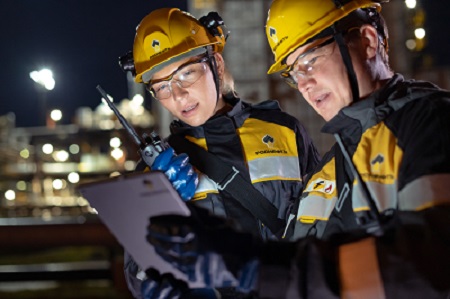
- ~40 % share in Russian oil production.
- Largest independent gas producer in Russia.
- ≥ 25 % share of gas in the Company hydrocarbons production.
- ~30 % share of the Russian oil refining market.
- About 3 thousand retail sites.
Rosneft is the leader of the Russian oil sector and one of the world’s largest public production companies. Rosneft operates in all of Russian major oil and gas provinces, including West and East Siberia, the Volga region, the Urals, the Far East, Timano-Pechora, Krasnodar region and offshore areas of the Russian Federation.
Rosneft is the largest taxpayer in the Russian Federation. By the end of 2024, the volume of taxes and other payments paid by Rosneft to the country's consolidated budget exceeded 6.1 trillion rubles. This has become the maximum value not only in the oil company history, but also in the Russian market as a whole.
Exploration
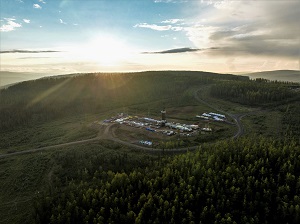 Rosneft - the undisputed leader in hydrocarbon reserves among the global public oil and gas companies.
Rosneft - the undisputed leader in hydrocarbon reserves among the global public oil and gas companies.
The Company conducts exploration activities in all the subsoil regions of the Russian Federation, including the Far East, East and West Siberia, Central Russia, Timano-Pechora and Southern Russia.
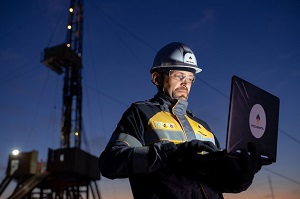 High exploration efficiency made it possible for the Company to discover 7 fields and 97 new deposits in 2024 with 0.2 bln toe of АВ1С1+B2С2 reserves. As per the Russian classification, by the end of 2024 Rosneft hydrocarbons reserves amounted to 21.5 bln toe (АВ1С1+В2С2 category).
High exploration efficiency made it possible for the Company to discover 7 fields and 97 new deposits in 2024 with 0.2 bln toe of АВ1С1+B2С2 reserves. As per the Russian classification, by the end of 2024 Rosneft hydrocarbons reserves amounted to 21.5 bln toe (АВ1С1+В2С2 category).
According to the reserves audit results by the PRMS international classification (Hydrocarbon Resource Management System), the Company 2P hydrocarbon reserves amounted to 11.4 bln toe. 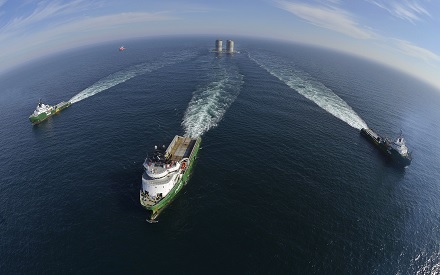 Production replacement by 2P reserves exceeds 100%.
Production replacement by 2P reserves exceeds 100%.
In 2024 production drilling exceeded 12 million meters and over 3,000 new wells were commissioned, 72% of them are horizontal.
Rosneft conducted 1.2 thousand km of 2D seismic and 5.3 thousand square km of 3D seismic onshore Russia in 2024. 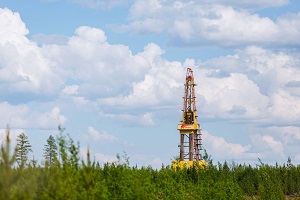 62 E&A wells were tested with a 89% success rate.
62 E&A wells were tested with a 89% success rate.
The Company is the largest subsoil user of the Russian shelf. Rosneft is working to implement a large-scale offshore exploration program, delivering every year beyond its license commitments.
Production and development
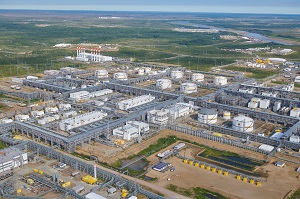 Rosneft is the largest company in Russia in terms of oil production. Following 2024 the Company hydracarbons production made 255.9 mln toe, including liquids - 184 mln tons.
Rosneft is the largest company in Russia in terms of oil production. Following 2024 the Company hydracarbons production made 255.9 mln toe, including liquids - 184 mln tons.
Rosneft is the largest independent gas producer in Russia. In 2024 the volume of gas production reached 87.5 bcm.
Refining and Petrochemicals
Rosneft is the Russian refining industry leader. In 2024, the Company processed 82.6 mln tons of oil.
The Company refining and petrochemical block includes 13 large refineries, three petrochemical plants, four gas processing plants, three catalyst production plants, and one service company.
Rosneft is a leader in the domestic market of catalysts for petrochemical industry. The Company plants manufacture products that are comparable to the world's best analogues and even ourperform them by some parameters.
Since 2020, Rosneft has completely stopped using imported catalysts and has been using only its in-house produced hydrotreatment and hydrocracking catalysts. Thus, the most important strategic task to reduce the dependence of the domestic oil refining industry on imported catalysts was solved.
More than 2 thousand tons of diesel fuel hydrotreatment catalysts and protective layer catalysts, 138 tons of reforming catalysts and about 390 tons of catalysts and adsorbents for hydrogen production plants were produced in 2024.
The company continues to introduce diesel fuel hydrotreatment catalysts with restored activity at its plants: more than 1.6 thousand tons of used diesel fuel hydrotreatment catalysts have been regenerated and reactivated.
Fuel supplies and retail sales
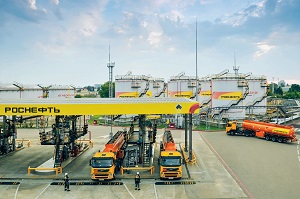 Sustainable supply of high-quality motor fuel to Russian consumers is one of Rosneft key priorities.
Sustainable supply of high-quality motor fuel to Russian consumers is one of Rosneft key priorities.
In 2024 the Company sold 43.6 mln tons of petroleum products on the domestic market, including 13.1 mln tons of gasoline and 18.1 mln tons of diesel fuel.
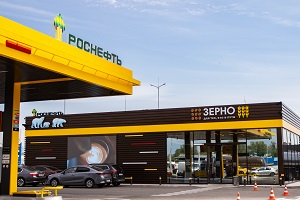 Rosneft is an active trading participant on the St. Petersburg International Mercantile Exchange (JSC SPIMEX). In 2024 Rosneft sold 10.1 mln tons of motor fuel on the exchange, which is twice the required volume.
Rosneft is an active trading participant on the St. Petersburg International Mercantile Exchange (JSC SPIMEX). In 2024 Rosneft sold 10.1 mln tons of motor fuel on the exchange, which is twice the required volume.
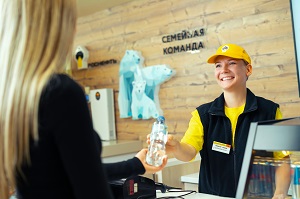 The Rosneft brand of retail sites is one of the leaders in terms of brand recognition and fuel quality. At present the Company retail business geography covers 62 regions of Russia. Rosneft manages about 3 000 retail sites.
The Rosneft brand of retail sites is one of the leaders in terms of brand recognition and fuel quality. At present the Company retail business geography covers 62 regions of Russia. Rosneft manages about 3 000 retail sites.
 Stores, cafes, pharmacies, vending machines and clothes` dry cleaning receiving/delivering units operate at the retail sites. The Company also develops a new customer services area at the retail sites - food-trucks (mobile sales sites).
Stores, cafes, pharmacies, vending machines and clothes` dry cleaning receiving/delivering units operate at the retail sites. The Company also develops a new customer services area at the retail sites - food-trucks (mobile sales sites).
Rosneft implements a program of compressed natural gas (CNG) retail sites. By the end of 2024 the Company gas filling infrastructure consists of 35 facilities: 12 automotive gas filling compressor stations and 23 CNG sales sites at retail sites.
 The Company equips its retail sites with charging infrastructure for electric vehicles. By the end of 2024 82 electric charging stations have been installed at Rosneft filling stations, including 72 fast (50-150 kW) and 10 slow (22 kW) ones. The stations are located in 12 regions of the country, including Moscow, Moscow Region, St. Petersburg, Leningrad Region, Lipetsk Region, Voronezh Region, the Republic of Buryatia, Krasnodar and Zabaikalye Territories, Tver, Kemerovo and Tula regions.
The Company equips its retail sites with charging infrastructure for electric vehicles. By the end of 2024 82 electric charging stations have been installed at Rosneft filling stations, including 72 fast (50-150 kW) and 10 slow (22 kW) ones. The stations are located in 12 regions of the country, including Moscow, Moscow Region, St. Petersburg, Leningrad Region, Lipetsk Region, Voronezh Region, the Republic of Buryatia, Krasnodar and Zabaikalye Territories, Tver, Kemerovo and Tula regions.
Sustainable Development (ESG)
The Rosneft Strategy is based on building business with regard to the most stringent HSE requirements.
The Company BoD approved Rosneft-2030 development strategy. The strategy priorities are operational leadership, efficiency increase and sustainable development.
Rosneft directly contributes to the implementation of the 17 sustainable development UN goals not only as part of its core activities, but also through support and participation in various projects and initiatives aimed at improving life quality in the regions of operations, development of public health services, science and education, culture and environmental protection.
In 2024 Rosneft confirmed its sustainable development leading position and a high information disclosure quality.
The company was included in the calculation base of the Moscow Stock Exchange Index "RAEX ESG balanced" with the best indicators among Russian oil and gas companies. Rosneft has become the only Russian oil and gas company with the AA ESG rating awarded by the RAEX agency for its "very high" level of ESG risk and opportunity management. At the same time, the management component rating is the highest - AAA.
According to the RAEX study results, Rosneft is recognized as a leader in water resources rational use. Rosneft became the only Russian oil and gas company to be among the top 10 rating participants with the highest rate of rational water consumption as well as the quality of water use corporate policies and programs. The share of recycled and reused water used by the Company Subsidiaries has consistently exceeded 90% for 10 years.
In addition, Rosneft became the only Russian oil and gas company with a top-level A+ rating "Leader of Russian Corporate ESG Practice" from the Da-Strategy Corporate Development Agency.
Rosneft-2030 Strategy
The key priorities of Rosneft-2030 strategy are operational leadership, increased efficiency and sustainable development.
Rosneft-2030 strategy defines the Company development areas in all business segments:
- maintaining leadership in unit production costs with a production target of 330 million tons of oil equivalent;
- 25% or more – the share of gas in total production; • increase of light products yield at the Russian refineries up to 70%;
- development and monetization of presence in strategic Asian markets;
- increased payments to Rosneft shareholders and increased profitability;
- growth of the domestic software share;
- application of approaches to biodiversity conservation and implementation of the "circular economy" principles;
- 100% waste disposal and land reclamation from "historical heritage";
- striving for zero fatal injuries and zero accidents;
- continued implementation of corporate and social programs that ensure human resources development and make a significant contribution to the implementation of the Russian Federation national priorities;
- reduction of greenhouse gas emissions.
Science and Innovations
 Rosneft is a leader in the innovative change of the Russian oil and gas industry. Company efforts are aimed at intellectual and technological potential development for the industry based on the strong foundation of the Russian oil and gas school - one of the best in the world.
Rosneft is a leader in the innovative change of the Russian oil and gas industry. Company efforts are aimed at intellectual and technological potential development for the industry based on the strong foundation of the Russian oil and gas school - one of the best in the world.
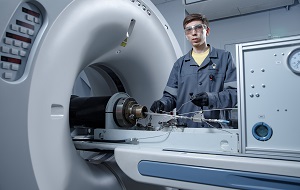 Rosneft has established the largest Scientific and Design Complex in Europe, which has a large-scale infrastructure and outstanding research potential: it includes 30 institutes employing more than 18,500 highly qualified specialists.
Rosneft has established the largest Scientific and Design Complex in Europe, which has a large-scale infrastructure and outstanding research potential: it includes 30 institutes employing more than 18,500 highly qualified specialists.
The scientific and design unit is represented in all regions of the Company presence. At the same time, the applied interest of scientists covers all business areas: from mining to retail.
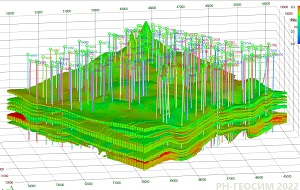 Rosneft is the first oil company in Russia that successfully created and develops a line of its own software to solve operating tasks related to geology, design, field development and operation. The specialists of the Scientific and Design Unit have developed 24 software packages, of which 17 have already been implemented in production, including PH-GRID for hydraulic fracturing modeling, RN-GEOSIM for geological modeling, RN-KIM for hydrodynamic modeling, etc.
Rosneft is the first oil company in Russia that successfully created and develops a line of its own software to solve operating tasks related to geology, design, field development and operation. The specialists of the Scientific and Design Unit have developed 24 software packages, of which 17 have already been implemented in production, including PH-GRID for hydraulic fracturing modeling, RN-GEOSIM for geological modeling, RN-KIM for hydrodynamic modeling, etc.
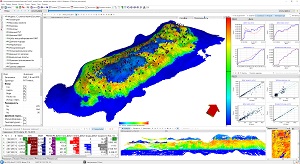 Rosneft uses 96% of its own software for exploration and production, and 100% own software in areas such as hydrodynamic modeling, hydraulic fracturing design, and geonavigation.
Rosneft uses 96% of its own software for exploration and production, and 100% own software in areas such as hydrodynamic modeling, hydraulic fracturing design, and geonavigation.
The Company software products are superior to their foreign analogs both in terms of the list of resolved tasks and calculations speed. In order to ensure technological independence and accelerate transition to domestic software platforms, corporate high-tech software for oil and gas production has been adapted to work in domestic Linux operating systems.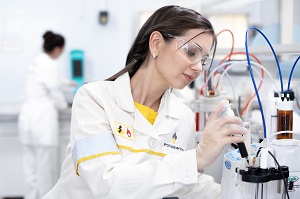 8 software products are included in the Unified Register of Russian Programs for Electronic Computers and Databases.
8 software products are included in the Unified Register of Russian Programs for Electronic Computers and Databases.
As part of the digital transformation and development of IT technologies, the digitization of the entire oil production process is ongoing. Full-scale digital twins are currently operating on the Company assets in Bashkiria and Tyumen Region. The project is also being scaled to other subsidiaries.
Rosneft has an Innovative Development Program that is focused on achieving the Company's priority goals and addresses the challenges of efficiency, sustainable development, transparency, social responsibility and innovation.
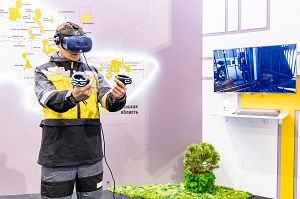 In 2024 systematic work continued to implement the obtained R&D results and consolidate intellectual property rights. The company has filed 71 applications for protection documents, received 74 patents, and by the end of 2024 Rosneft owns 1,101 patents for innovative developments.
In 2024 systematic work continued to implement the obtained R&D results and consolidate intellectual property rights. The company has filed 71 applications for protection documents, received 74 patents, and by the end of 2024 Rosneft owns 1,101 patents for innovative developments.
Rosneft relies on accelerated business digitalization and industrial Internet technologies, which will fundamentally strengthen control over material flows and eliminate the human error factor.
Environment Protection
Rosneft pays particular attention to environmental protection, conservation and restoration of natural resources.
In 2024 Rosneft "green" investments amounted to 74 billion rubles and exceeded the level of the previous year by 16%. Over the past three years the investments totaled to almost 200 billion rubles.
The Company environmental initiatives include associated petroleum gas rational use, reduction of greenhouse gas emissions, optimization of water treatment and disposal processes, land reclamation and ecosystem protection.
As part of Gas Investment Program implementation, the Company strives to increase associated petroleum gas (APG) rational use in all the regions of presence. In 2024 Rosneft commissioned 9 new facilities in order to meet this objective: facilities for gas injection into the reservoir, power generation, gas treatment and utilization, as well as gas transportation infrastructure. The program is implemented in all the regions of the Company presence and promotes a broad introduction of innovative, energy-saving, "green" technologies into production processes. Rosneft capital investments into APG utilization projects exceeded 303 billion rubles for the 2013 – 2024 period.
As for natural resources conservation the Company is actively implementing "circular economy" ("closed-loop economy") principles, which involves waste-free production technologies, resources reuse and restoration.
Rosneft implements a number of comprehensive programs for natural resources conservation and restoration. Natural absorption mechanism is an important part Rosneft strategy. The Company is already making a significant contribution to the greenhouse gas emissions absorption by forests, annually planting trees in the regions of presence. In 2024 Rosneft subsidiaries planted almost 11 million tree seedlings in the regions of presence. Over the past four years, the Company Subsidiaries have planted a total of about 37 million seedlings and saplings of trees, making a significant contribution to nature and biological diversity conservation in Russia.
The Company pays particular attention to the reproduction of aquatic biological resources. The Group Subsidiaries ensure the reproduction of juvenile fish and their release into river systems. In 2024 the Company Subsidiaries released about 22 million fry.
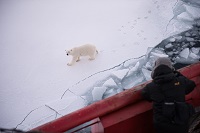 In July 2012 Rosneft sent two research vessels to the northern seas for the first time to study runoff winds blowing from Novaya Zemlya. This expedition launched the largest Arctic research in recent history. Over the years Rosneft has already conducted over 60 comprehensive expeditions, many of which are unique.
In July 2012 Rosneft sent two research vessels to the northern seas for the first time to study runoff winds blowing from Novaya Zemlya. This expedition launched the largest Arctic research in recent history. Over the years Rosneft has already conducted over 60 comprehensive expeditions, many of which are unique.
The Company implements projects to study and protect Arctic animals and birds, which are the indicators of the regional ecosystems sustainability. There are expeditions to study polar bear, Atlantic walrus, wild reindeer, Siberian sable and Ivory gull, which are included in the Red Books of various levels.
In 2024 Rosneft launched a new biodiversity conservation program called Tamura with a purpose to update information about key animal species in the regions, including their bioindicators. Reindeer, polar bears, valuable bird species, and fish at the mouth of the Yenisei River will be studied on the Taimyr Peninsula until 2027. 10 expeditions will be conducted in 4 years.
Information about animal populations will make it possible for scientists to understand their habitat conditions and develop measures to preserve Arctic biodiversity.
Rosneft takes care of polar bears in all of the country's zoos and finances the construction of new enclosures to make the bears' living conditions as comfortable and close to their natural habitat as possible.
Social Responsibility
Rosneft implements social programs in all the regions of presence - it builds modern hospitals, sports complexes, ice arenas, schools and kindergartens.
The Company has strategic cooperation agreements with local authorities which are focused on social infrastructure development. Large-scale projects are being implemented re-shaping towns and settlements and providing local residents with a direct access to modern health care, educational, sports, recreation and housing and utility services.
Quite often Company subsidiaries are major employers at their locations so they undertake to maintain streets and roads, build bridges, repair utility and transportation networks, electricity and heat supply facilities, replace equipment.
Rosneft implements dozens of health care and medicine development projects. Significant funds are allocated for construction, capital repair and reconstruction of health care institutions (clinics, hospitals, medical centers), improvement of their facilities and infrastructure, purchase of new medical and diagnostic equipment. Major social projects in this area include a multifunctional medical center in Gelendzhik, a new building of Saratov children's hospital, a comprehensive response system for emergency medical services in the Far North conditions.
Sport activities support is another priority of Rosneft and Subsidiaries` social policy. The Company funds the construction of ice arenas, sport complexes and multi-functional sports grounds in the regions of presence.
The Company supports both amateur and professional sports. Rosneft is the owner of CSKA Hockey Club, it finances Tula Arsenal Football Club, acts as a general sponsor of LADA Sport ROSNEFT racing team, helps Russian sambo wrestlers and contributes to various regional sport development programs.
Rosneft actively participates in important Russian cultural events. The Company funds projects that shape the cultural image of the country, influence national identity and form understanding of high culture in society. Supported projects include the Boris Eifman Ballet, the Sretensky Monastery Choir and the State Hermitage Museum.
With the Company support an updated exhibition "Culture and Art of China", dedicated to China culture and art from antiquity to the 20th century, was opened at the State Hermitage Museum in 2024. Moreover, the museum also has a permanent exhibition "Ancient colonization of the Northern Black Sea region."
Rosneft organizes Russian cultural events in friendly countries, contributing to international cultural relations development and Russian cultural heritage popularization.
With the Company support the Mariinsky Theatre under the direction of Valery Gergiev staged "One Thousand and One Nights" in Qatar. In October 2024 a tour of Tatiana Navka's ice show "Scheherazade's Love Story" took place in Ahmedabad, India. Performances on ice were held for the first time in India. The audience specially traveled from New Delhi, Mumbai and other cities of the country to the ice show in Ahmedabad.
Rosneft at the international exhibition-forum "Russia"
In 2024 the Rosneft exposition continued its work at the International Exhibition-Forum "Russia", organized by decree of the President of the Russian Federation Vladimir Putin.
In its pavilion the Company presented main production and social achievements. The Rosneft exposition became one of the attraction centers for VDNKh guests - over 1.02 million people visited the Rosneft pavilion from November 4, 2023 to July 8, 2024.
Weekly thematic events were held in the Rosneft pavilion, which were dedicated to the Company activities, its work in the Russian regions, environmental and scientific projects, cultural and geographical diversity of our country, significant dates of federal importance and professional holidays.
Events were held with the involvement of Rosneft labor dynasties` representatives. The families of the Company employees took part in the opening ceremony of the Year of the Family in Russia with the participation of Russian President Vladimir Putin, as well as other initiatives under the All-Russian Family Forum "Family-Loved Ones".
During the eight months of the exhibition, Rosneft organized 138 thematic weeks/days with over 70 different performances and presentations and 159 lectures.
The digital equipment of the pavilion and interactive exhibits allowed visitors to get a deep understanding of the oil industry and the Company history, its prospects, scientific developments, social projects, as well as modern oil production methods. Specific sections of the exhibition were dedicated to oil industry development prospects, Vostok Oil flagship project and Rosneft scientific developments.
In addition to innovative interactive exhibits, the exhibition featured a diverse cultural program. Visitors could use audio guides voiced by People's Artist of Russia Nikita Mikhalkov, as well as Olympic champion Tatiana Navka.

-315xx70.png)